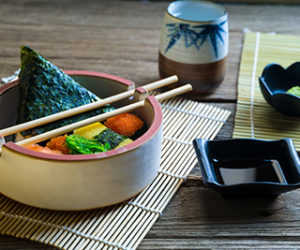 I taught English to Japanese. The Japanese claim the longest lifespans—and best diets. They eat Miso soup, made of fermented beans, that is brimming with probiotics. The Japanese hardly blimp out either—a single plate of Canadian grub feeds a Japanese family-of-four.
I taught English to Japanese. The Japanese claim the longest lifespans—and best diets. They eat Miso soup, made of fermented beans, that is brimming with probiotics. The Japanese hardly blimp out either—a single plate of Canadian grub feeds a Japanese family-of-four.
But McDonalds sprouted in Japan, luring Japanese youth to fatty diets. Sushi and plants got shoved aside for cows on white wheat buns. We are what we eat.
Lately, I’ve been chomping mostly plants. So, eating a small salad and salmon stuffs me. But not long ago, I gorged buffet meats. After each buffet, I’d fret crammed slabs of beef piercing my intestinal walls. I guzzled five teas daily, too—sweetened with fifteen packs of sugar. Thus, my nose glowed with zits. But when I heard sugary teas lead to diabetes, I began drinking tea black. No less enjoyment. No ghastly golf-balls pocking my nose.
Unlike meats and sweets, plants reduce the risk of cancer. And low cancer rates in Japan lend to longer lifespans. So, Japan’s lion-share of seniors makes Canada’s baby boomers look like cubs.
As for me, I stand at risk for cancer. Doctors dragged me in for cancer screenings every three months. Fed up, I hid for a year. When I resurfaced, a doctor found a lump. So, she hauled me in for a biopsy. Nothing. Then an MRI. Still nothing. Now, I believe I’m cancer free, as I guzzle green tea—like the Japanese.
My hope? To go a year without radiation. One tech said x-rays are simply the same as a summer in the sun. In other words, I’ve had more sun than Jane Fonda, Pamela Anderson, and Chernobyl combined.
Colin Campbell and Thomas Campbell talk about lessons from China in their book The China Study: The Most Comprehensive Study of Nutrition Ever Conducted:
- Why should you learn lessons from the Chinese diet? “Good health is about being able to fully enjoy the time we do have … avoiding crippling, painful and lengthy battles with disease” (p. 75).
- The healthiest Chinese consume “much higher overall calorie intake, less fat, less protein, much less animal foods, more fiber and much more iron” (p. 74).
- The Chinese eat less “animal-based foods [which] are strongly linked to breast cancer” (p. 89).
- Americans are at high risk of dying from heart disease and breast cancer: “The death rate from coronary heart disease was seventeen times higher among American men than rural Chinese men. The American death rate from breast cancer was five times higher than the rural Chinese rate” (p. 79).
- Dietary fats cause many Western diseases: “The amount of dietary fat consumed was closely associated with the incidence of breast cancer, large bowel cancer and heart disease.” (p. 84).
- Dietary fats kill. Where do dietary fats come from? Mostly animal foods. “Dietary fat is an indicator of how much animal-based food is in the diet. It is almost a perfect match” (p. 83).
- So, eat less meat to lower dietary fats and bypass disease: “Reducing dietary fat from 24% to 6% was associated with lower breast cancer risk. However, lower dietary fat in rural China meant less consumption not only of fat but, more importantly, of animal-based food” (p. 87).
So, study foods eaten by friends from China and Japan. For instance, when asked what’s for dinner, Canadians say, steak or pork while the Chinese say, noodle or rice. The difference? Summers in the sun.

